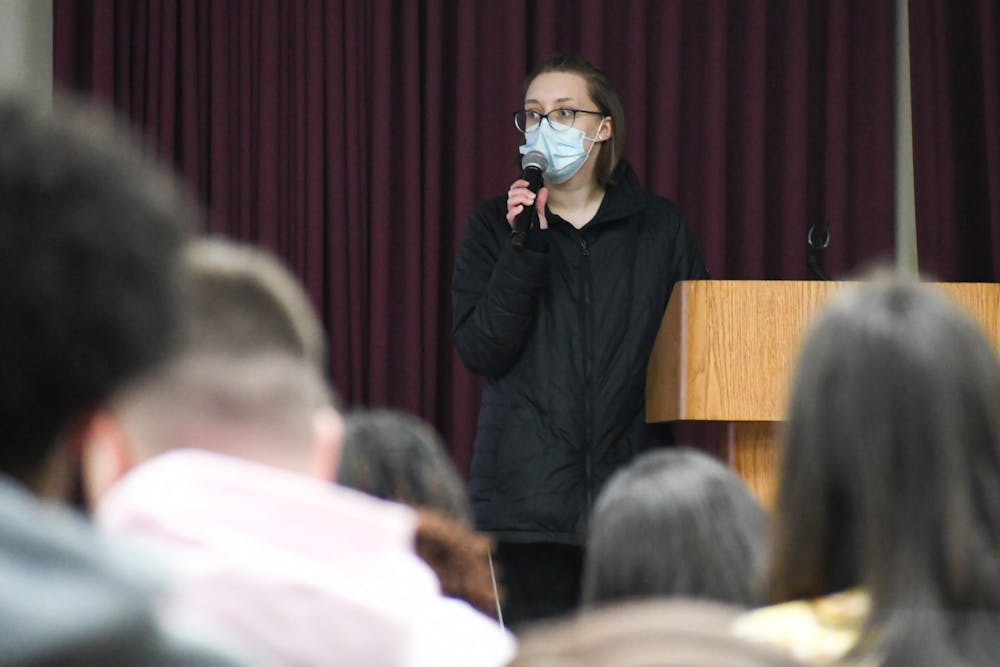Resolutions passed and failed at SGA meeting, April 17

At the last regular Student Government Association meeting of the 2022-2023 academic year, four resolutions faced criticism from the House meeting Monday night, April 17.
All four were introduced at last week’s meeting, but were up for more discussion and voting on Monday.
A resolution to standardize stair nosing on campus
This resolution was written by Nova Moore, chair of the diversity committee, with the intent to make buildings on campus more accessible for students, staff and faculty with visual impairments.
Stair nosing is the black textured tape put across each step. The purpose of this is to make each step more visually distinctive for users who would have a hard time telling them apart, and would otherwise risk injuring themselves by tripping or falling.
“Student Government Association recommends the establishment of standardized regulations for all on-campus buildings, requiring that stair noses on all staircases be marked both visually and tactilely for the safety of the staff, faculty and student populations,” according to the legislation.
The legislation said this would cost close to $100 for each of the eight intended academic buildings, totalling approximately $800 for the entire project.
At Monday’s meeting, this legislation passed unanimously, and will move on to President Bob Davies’ desk for approval.
A resolution to improve reporting mechanisms for student employees on campus
Also passed unanimously at Monday’s meeting was this resolution, written by Lauren Hull, a representative from the College of Education and Human Services.
In the resolution, Student Employment Services is asked to clarify for student employees how to report issues they have with their employers, and employers are asked to post this information in the workplace.
Hull pointed out in the document that she conducted a survey of 53 current or former student employees at the beginning of this semester. Over 75% of respondents did not know how to get help if their rights had been violated.
A resolution to amend article VII of the Central Michigan University SGA Constitution to clarify the rights of candidates in SGA Executive Board elections
Not only did reading the title of Hull’s second resolution take the wind out of Speaker of the House Ashley Harvey, it also wasn’t very popular.
The resolution was intended to clarify the election bylaws within SGA and have election committee members approved by a two-thirds majority in the House and Senate, rather than rely on the members of the committee being appointed by the sitting SGA president.
The House voted unanimously to strike it down.
Representatives pointed out a major flaw in the resolution: it’s a resolution. Because this attempt to change the SGA constitution was written as a “resolution” and not as “legislation,” it would be rendered ineffective if it passed.
Harvey explained that if the resolution was passed, its implementation would be up to the discretion of SGA's incoming executive board. If it had been actual legislation, they would be required to make the changes it outlines, but as it is, the resolution is essentially a suggestion.
“This was not written as a legislative bill, this is a resolution, which does not have that ability,” Harvey said. “It has to be a legislative bill in order to truly amend the SGA constitution.”
A resolution to allow student paraprofessional staff to allocate their flex dollars towards parking permits on campus
Also shot down in the House was a resolution from Sen. Rwanda Jenkins that would have allowed Residence Life student staff to purchase a parking permit with their flex dollars.
Representatives at Monday’s meeting pointed out that flex dollars exist within a system that is entirely separate from CMU parking services, so the reallocation of funds wouldn’t correlate with where the money is received.
Another question raised by representatives at the meeting was why this change would only apply to paraprofessional staff, rather than including all students who might wish to spend their flex dollars on a parking space.
The House vote against this resolution was almost unanimous, with a few representatives choosing to abstain.






